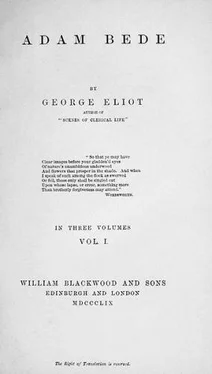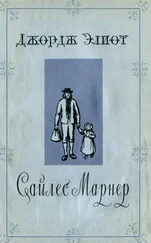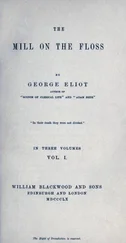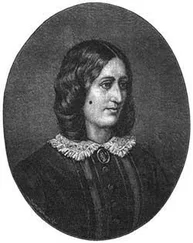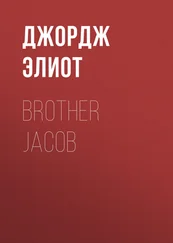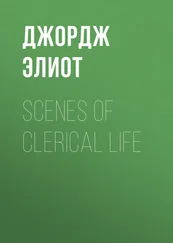"I've never any need to drive Gyp back," said Adam, laughing. "He always turns back of his own head when he finds out I'm coming here."
"Aye, aye," said Bartle. "A terrible woman! — made of needles, made of needles. But I stick to Martin — I shall always stick to Martin. And he likes the needles, God help him! He's a cushion made on purpose for 'em."
"But she's a downright good-natur'd woman, for all that," said Adam, "and as true as the daylight. She's a bit cross wi' the dogs when they offer to come in th' house, but if they depended on her, she'd take care and have 'em well fed. If her tongue's keen, her heart's tender: I've seen that in times o' trouble. She's one o' those women as are better than their word."
"Well, well," said Bartle, "I don't say th' apple isn't sound at the core; but it sets my teeth on edge — it sets my teeth on edge."
The Meeting on the Hill
ADAM understood Dinah's haste to go away, and drew hope rather than discouragement from it. She was fearful lest the strength of her feeling towards him should hinder her from waiting and listening faithfully for the ultimate guiding voice from within.
"I wish I'd asked her to write to me, though," he thought. "And yet even that might disturb her a bit, perhaps. She wants to be quite quiet in her old way for a while. And I've no right to be impatient and interrupting her with my wishes. She's told me what her mind is, and she's not a woman to say one thing and mean another. I'll wait patiently."
That was Adam's wise resolution, and it throve excellently for the first two or three weeks on the nourishment it got from the remembrance of Dinah's confession that Sunday afternoon. There is a wonderful amount of sustenance in the first few words of love. But towards the middle of October the resolution began to dwindle perceptibly, and showed dangerous symptoms of exhaustion. The weeks were unusually long: Dinah must surely have had more than enough time to make up her mind. Let a woman say what she will after she has once told a man that she loves him, he is a little too flushed and exalted with that first draught she offers him to care much about the taste of the second. He treads the earth with a very elastic step as he walks away from her, and makes light of all difficulties. But that sort of glow dies out: memory gets sadly diluted with time, and is not strong enough to revive us. Adam was no longer so confident as he had been. He began to fear that perhaps Dinah's old life would have too strong a grasp upon her for any new feeling to triumph. If she had not felt this, she would surely have written to him to give him some comfort; but it appeared that she held it right to discourage him. As Adam's confidence waned, his patience waned with it, and he thought he must write himself. He must ask Dinah not to leave him in painful doubt longer than was needful. He sat up late one night to write her a letter, but the next morning he burnt it, afraid of its effect. It would be worse to have a discouraging answer by letter than from her own lips, for her presence reconciled him to her will.
You perceive how it was: Adam was hungering for the sight of Dinah, and when that sort of hunger reaches a certain stage, a lover is likely to still it though he may have to put his future in pawn.
But what harm could he do by going to Snowfield? Dinah could not be displeased with him for it. She had not forbidden him to go. She must surely expect that he would go before long. By the second Sunday in October this view of the case had become so clear to Adam that he was already on his way to Snowfield, on horseback this time, for his hours were precious now, and he had borrowed Jonathan Burge's good nag for the journey.
What keen memories went along the road with him! He had often been to Oakbourne and back since that first journey to Snowfield, but beyond Oakbourne the greystone walls, the broken country, the meagre trees, seemed to be telling him afresh the story of that painful past which he knew so well by heart. But no story is the same to us after a lapse of time — or rather, we who read it are no longer the same interpreters — and Adam this morning brought with him new thoughts through that grey country, thoughts which gave an altered significance to its story of the past.
That is a base and selfish, even a blasphemous, spirit which rejoices and is thankful over the past evil that has blighted or crushed another, because it has been made a source of unforeseen good to ourselves. Adam could never cease to mourn over that mystery of human sorrow which had been brought so close to him; he could never thank God for another's misery. And if I were capable of that narrow-sighted joy in Adam's behalf, I should still know he was not the man to feel it for himself. He would have shaken his head at such a sentiment and said, "Evil's evil, and sorrow's sorrow, and you can't alter it's natur by wrapping it up in other words. Other folks were not created for my sake, that I should think all square when things turn out well for me."
But it is not ignoble to feel that the fuller life which a sad experience has brought us is worth our own personal share of pain. Surely it is not possible to feel otherwise, any more than it would be possible for a man with cataract to regret the painful process by which his dim blurred sight of men as trees walking had been exchanged for clear outline and effulgent day. The growth of higher feeling within us is like the growth of faculty, bringing with it a sense of added strength. We can no more wish to return to a narrower sympathy than a painter or a musician can wish to return to his cruder manner, or a philosopher to his less complete formula.
Something like this sense of enlarged being was in Adam's mind this Sunday morning, as he rode along in vivid recollection of the past. His feeling towards Dinah, the hope of passing his life with her, had been the distant unseen point towards which that hard journey from Snowfield eighteen months ago had been leading him. Tender and deep as his love for Hetty had been — so deep that the roots of it would never be torn away — his love for Dinah was better and more precious to him, for it was the outgrowth of that fuller life which had come to him from his acquaintance with deep sorrow. "It's like as if it was a new strength to me," he said to himself, "to love her and know as she loves me. I shall look t' her to help me to see things right. For she's better than I am — there's less o' self in her, and pride. And it's a feeling as gives you a sort o' liberty, as if you could walk more fearless, when you've more trust in another than y' have in yourself. I've always been thinking I knew better than them as belonged to me, and that's a poor sort o' life, when you can't look to them nearest to you t' help you with a bit better thought than what you've got inside you a'ready."
It was more than two o'clock in the afternoon when Adam came in sight of the grey town on the hill-side and looked searchingly towards the green valley below, for the first glimpse of the old thatched roof near the ugly red mill. The scene looked less harsh in the soft October sunshine than it had in the eager time of early spring, and the one grand charm it possessed in common with all wide-stretching woodless regions — that it filled you with a new consciousness of the overarching sky — had a milder, more soothing influence than usual, on this almost cloudless day. Adam's doubts and fears melted under this influence as the delicate weblike clouds had gradually melted away into the clear blue above him. He seemed to see Dinah's gentle face assuring him, with its looks alone, of all he longed to know.
He did not expect Dinah to be at home at this hour, but he got down from his horse and tied it at the little gate, that he might ask where she was gone to-day. He had set his mind on following her and bringing her home. She was gone to Sloman's End, a hamlet about three miles off, over the hill, the old woman told him — had set off directly after morning chapel, to preach in a cottage there, as her habit was. Anybody at the town would tell him the way to Sloman's End. So Adam got on his horse again and rode to the town, putting up at the old inn and taking a hasty dinner there in the company of the too chatty landlord, from whose friendly questions and reminiscences he was glad to escape as soon as possible and set out towards Sloman's End. With all his haste it was nearly four o'clock before he could set off, and he thought that as Dinah had gone so early, she would perhaps already be near returning. The little, grey, desolate-looking hamlet, unscreened by sheltering trees, lay in sight long before he reached it, and as he came near he could hear the sound of voices singing a hymn. "Perhaps that's the last hymn before they come away," Adam thought. "I'll walk back a bit and turn again to meet her, farther off the village." He walked back till he got nearly to the top of the hill again, and seated himself on a loose stone, against the low wall, to watch till he should see the little black figure leaving the hamlet and winding up the hill. He chose this spot, almost at the top of the hill, because it was away from all eyes — no house, no cattle, not even a nibbling sheep near — no presence but the still lights and shadows and the great embracing sky.
Читать дальше
